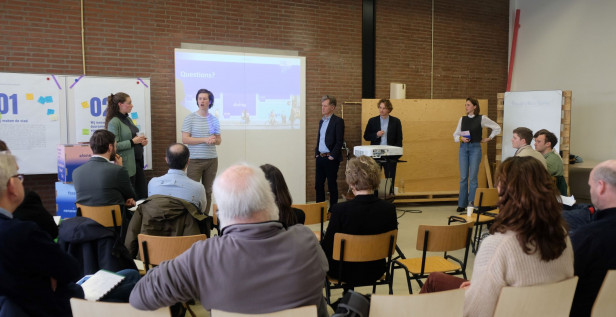On the 16th of March, we gathered at the Marineterrein for the first Data Dilemma's event of 2023. This edition's programming was centered around the Energy transition and considerations for the use of digital technology in such transitions. The different speakers and topics raised questions around inclusion, access and ownership of data. Enjoy our summary of this insightful afternoon!
Alliander’s Local Inclusive Future Energy (LIFE) Project. - Reinier Prins (Alliander)
Reinier introduced his presentation by describing the current state of the Energy domain. Its problems consist mainly of congestion on the energy grid and the rising energy prices, while its solutions are implemented through, for example, law and regulations, new technologies, and the emergence of new forms of local cooperation. Alliander saw an opportunity to contribute to the latter, focussing on the strengthening of local energy communities and reinforcing the existing electricity network.
Within Alliander’s Local Inclusive Future Energy (LIFE) Project, they have set up a Digital Twin in the form of a subway map. The map shows a simplified overview of a specific neighbourhood and shows you a topological map of transformers, its connections, and the maximum capacity of its cables. Studying this simplified map gives you valuable insights. You’ll be able to identify your neighbouring assets, with whom you could potentially exchange energy, and you’ll see which specific parts of the net have limited capacity left.
While this map is a great tool for the development of more local/cooperative energy communities, the detailed info it provides on the net’s energy capacity leads to a dilemma for Alliander. They are worried that if they make this info on (future) congestions public, people and companies will rush to buy and invest in all assets where there’s enough energy capacity left, which is not the desired effect. The crowd responded to this dilemma with critical questions and advice. They mainly revolved around the idea that that citizens and its perspectives should be more involved in the design of the map and its purpose. Also, Alliander should not be afraid to discuss this very dilemma with a group of users/citizens and ask for their advice on the matter.
Digital Technologies for spatial planning and the energy transition. - Paul Strijp (Provincie Noord-Holland) and Allerd Nanninga (Rathenau Instituut).
Together with his team from the Province of North-Holland, Paul Strijp is setting up a Digital Twin for the ‘North Sea Canal Area’. This area, crossing multiple cities and municipalities, is home to many challenges regarding housing and energy production. This will help the Province in overseeing all the problems in physical space and decide who should govern each of those challenges. While the first prototype of this Digital Twin will be delivered in a few months, Paul Strijp took on a side quest with Romy Dekker and Allerd Nanninga from Rathenau Instituut; looking at the bigger picture and asking the ’slow questions’.
As Allerd Nanninga clarified in his part, retrieving data form the physical world, displaying this in a virtual space, and using this information/process to create new solutions or interventions, involves a lot of steps where subjectivity is involved. Even though working with data seems like an objective practice, all those steps involve decisions which could have political motives. For this reason, special attention should be given to justifying all choices made in each step. This difficult task is accompanied by the fact that you’re never able to measure ‘everything’. There is that, which technically can not be measured, and there is data which can not be seen because of a project’s focus. These mentioned dilemma’s translated into this presentation’s key message: ‘We need knowledge to flourish, though knowledge can misguide and obscure’
Later, when comments and questions arose from the audience, Paul Strijp touched upon a hard truth. While research and talks like these do a great job in convincing you to take the mentioned considerations into account, parties with a technical focus are often hard to convince because of the story’s lack of straight forward causalities. Another challenge is rooted in the fact that the Province doesn’t have a strong tradition of communicating with its citizens. Communicating and collaborating is something that’s necessary in a time where digital technologies intertwine with societal transitions and public participation wishes.
How do we, as a community, keep control over data, monitoring software and models for the energy transition? Julia Jansen (Waag)
Open source or cooperative development of digital systems. That’s Julia Jansen’s answer to the question above. In her presentation, Julia used different examples to show what open source or cooperative development of digital systems could look like. Hoomdossier, Econobis and the COFY-Box are all open source solutions which aren’t concerned with trading data of its users. The development of these (online) products can be co-decided and monitor by its ‘customers’; energy cooperatives who ‘own’ the product collectively.
This alternative way of developing and using data and software is something we should aim for if we wish to prevent big data factories to posess all of our systems and its yields. Additionally, it inreaces transparency and accountability of the systems, and it increases innovation by re-use and sharing between communities.
Julia Janses ended her presentation by stating that ‘technology developed with public finds should be returned to society as much as possible.’ If you build something with the help of data from the public, its product or result should be serving the public as well. A great first step towards democratizing technology is that open source should be the standard.
Would you like to join our next Data Dilemmas? The upcoming session is scheduled on the 25th of May (topic and speakers to be announced). Keep an eye out on our platform for the programme!





